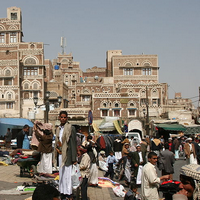The recent rocket attack on a convoy carrying British embassy staff in the Yemeni capital of San'a raises important questions about security and terrorism in that Gulf country. The United States is currently proposing to allocate $1.2 billion of military equipment and training over the next six years to combat al-Qaida in Yemen. In response, critics both within and beyond government circles are calling for a more holistic approach that focuses on long-term economic development and stability there and in the wider Middle East region. Presently lacking in this debate is the understanding that security and development are not mutually exclusive.
Indeed, both interests can be advanced simultaneously, so why is a dual-track option such a hard sell? The security-development divide (.pdf) is rooted in a longstanding conundrum: Policymakers widely agree that long-term security is not possible without development, while at the same time, they understand that sustainable development is unachievable in the absence of security.
Nevertheless, an unwillingness to propose dual-track approaches persists. The most recent debates over how to combat terrorism in countries such as Yemen, Pakistan and Somalia are recent examples of this disconnect. In each case, policy tilted heavily in favor of military expenditures. Consider last year's funding for development compared to that for security: Wealthy countries spent $120 billion on the former, just 8 percent of the $1.5 trillion allocated to the latter.

